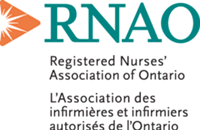RNAO leaders head out on a provincial tour to discuss health issues with Ontario nurses
TORONTO, Oct. 3, 2016 /CNW/ - A report that highlights the alarming trend of replacing registered nurses (RN) with less qualified health-care providers will be the focus of a provincial tour taking place throughout October.
President Carol Timmings and Chief Executive Officer Doris Grinspun of the Registered Nurses' Association of Ontario (RNAO) will be visiting nurses in their communities to discuss their experiences delivering care in Ontario's health system.
In May, the association released Mind the safety gap in health system transformation: Reclaiming the role of the RN. The report is an in-depth review of trends in nursing employment, and shows that the health minister's plans to improve the system don't match the health human resources realities in the province.
"The minister says he's committed to putting patients first, but it is well known that Ontario RNs continue to be replaced by less qualified health workers in a short-sighted bid to cut costs," says Timmings. "This doesn't make sense because patients in hospital are much sicker and have more complex care needs than ever before."
Over a nine-year period (between 2005 and 2014), RNAO says the RN share of employment dropped in almost every sector where nurses work. "This happened despite conclusive evidence that shows health organizations with a higher proportion of RNs experience fewer hospital re-admissions, lower complication rates, and lower rates of death," says Timmings.
RNAO's report contains a total of eight recommendations, which Grinspun says can solve many of the system's current problems. "Minister Hoskins says he is committed to making necessary improvements to our system, and I know he genuinely means it. That's why the logical next step is adopting the report's first two recommendations, which call for the government to create an interprofessional health human resources plan and stop RN replacement. Nurses make up the largest share of regulated health professionals in the province, and a comprehensive plan is needed to ensure they are deployed effectively, and to stop the bleeding of RNs from our health system."
The association's report also highlights the barriers that currently prevent RNs and nurse practitioners (NP) from working to their full scope of practice. Currently, RNs are prohibited from independently prescribing medications, and NPs are unable to prescribe controlled substances despite having the knowledge and expertise to do so. NPs also face restrictions on the kinds of x-rays, and diagnostic tests they can order, including MRIs. "Increasing their contribution means people will get timely access to quality care and the health system will be cost-effective and more efficient," adds Timmings. Premier Wynne's recent mandate letter to the health minister includes direction to move ahead with some scope of practice expansions, a move RNAO says nurses will celebrate during the tour.
Grinspun says the association intends to hold the minister accountable to his commitment to locate care coordinators within primary care. "If Minister Hoskins wants more comprehensive care delivered in the community, fully utilizing the expertise of RNs, NPs and registered practical nurses (RPN) supported by personal support workers, is key." She adds there are 3,500 RN care co-ordinators currently working in community access care centres and it is absolutely essential that they be used to help people with complex care needs.
RNAO's report also recommends that RNs be responsible for every first home care visit conducted in the province to ensure proper assessment and access to health services. Grinspun says that "most home care agencies are already assigning RNs to conduct the first in-home client's assessment, and the province should standardize this requirement through the Local Health Integration Networks (LHINs) so that patients anywhere in the province can expect the same quality of home care services."
Grinspun says frontline nursing staff are central in the delivery of health services for Ontarians. "If employers continue to replace RNs, not only are we compromising care, we are also putting the safety of patients at risk and no one wants to see that happen."
Details of RNAO's fall tour:
- Whitby: Durham Regional Headquarters, 605 Rossland Rd. East, Tuesday, Oct. 4, from 6:30 - 9 p.m. (Room 1A)
- Toronto: The Old Mill, 21 Old Mill Rd., Thursday, Oct. 6, from 6:30 - 8:30 p.m.
- London: Wolf Performance Hall, London Central Library, 251 Dundas Street, Friday, Oct. 14, from 6:30 - 8:30 p.m.
- Ottawa: City of Ottawa, 100 Constellation Ave., Mary Pitt Building, Monday, Oct. 17, from 6:30 - 8:30 p.m. (Room 100)
- Hamilton: Binkley United Church, 1570 Main St. West, Tuesday, Oct. 25, from 6:30 - 8:30 p.m. (Boardroom A)
- St. Catharines: Rockway Vineyard, 3290 Ninth St., Wednesday, Oct. 26, from 5:30 - 9 p.m.
Members of the media are welcome to attend.
RNAO is the professional association representing registered nurses, nurse practitioners, and nursing students in Ontario. Since 1925, RNAO has advocated for healthy public policy, promoted excellence in nursing practice, increased nurses' contribution to shaping the health-care system, and influenced decisions that affect nurses and the public they serve. For more information about RNAO, visit RNAO.ca or follow us on Facebook and Twitter.
SOURCE Registered Nurses' Association of Ontario

To arrange an interview with a nurse, please contact: Marion Zych, Director of Communications, Registered Nurses' Association of Ontario (RNAO), 647-406-5605 (cellular), 416-408-5605 (office), [email protected]

Share this article